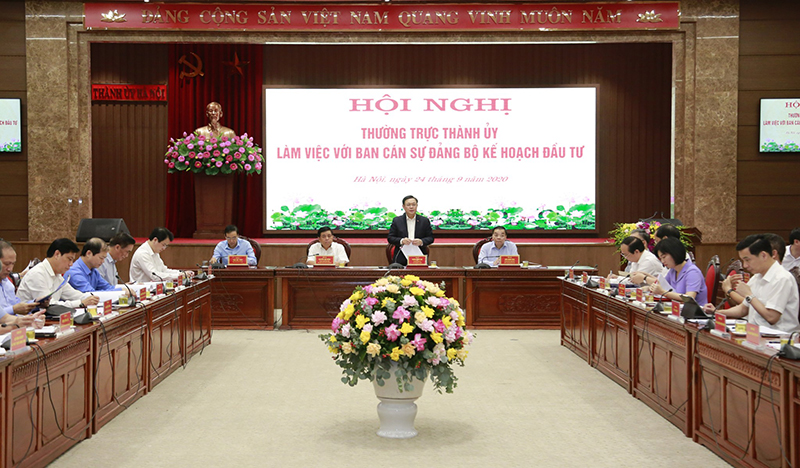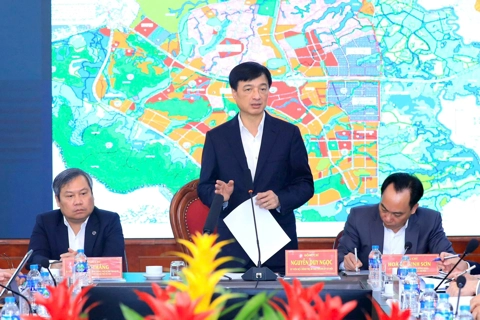Hanoi economy continues to improve despite Covid-19 pandemic
In the coming time, Hanoi would step up building a network of transport infrastructure to boost connectivity within the city and with other localities.
Despite numerous difficulties from the Covid-19 pandemic, Hanoi’s economy continues to expand with improvements seen in various aspects, including the business environment, investment efficiency and production activities, according to Nguyen Doan Toan, vice chairman of the Hanoi People’s Committee.
| Overview of the meeting. Photo: Thanh Hai. |
In the first six months of 2020, Hanoi’s gross regional domestic product (GRDP) expanded by 3.43% year-on-year, considerably higher than that of other cities/provinces and the national average of 1.81%, Mr. Toan said at meeting between the Standing Committee of the Party’ Committee of Hanoi and its Ministry of Planning and Investment (MPI)’ peer on September 24.
While the Covid-19 pandemic has caused severe impacts on the economy, the city has waived or delayed tax payments worth VND17.5 trillion (US$757.4 million), or 45% of the total amount of tax deferrals nationwide, for enterprises.
Additionally, capital mobilized by credit institutions in Hanoi grew 4.6% year-on-year, while the credit growth is estimated at 4% during the period.
Mr. Toan informed that Hanoi has 17,800 newly established enterprises with a combined registered capital of VND241.7 trillion (US$10.37 billion) to date, down 3% in the number but up 1% in value year-on-year. This resulted in a total of 295,800 operational enterprises in the city.
Notably, investment to Hanoi has been growing over the years. From 2016 to August 2020, the city attracted over US$25.5 billion in investment capital, of which US$13.5 billion has been fully disbursed.
During the 2016 – 2019 period, foreign-invested enterprises contributed US$3.41 billion to the city's budget revenue and created 310,370 jobs, or 11% of the total workforce.
Mr. Toan noted Hanoi was the top destination for FDI in 2018 and 2019 at US$7.5 billion and US$8.7 billion, respectively.
In 2020, the city has so far issued investment licenses for 229 projects worth VND405.57 trillion (US$17.6 billion), many of them at the “Hanoi 2020 – Investment and Development Cooperation” conference held on June 27.
In the eight-month period, Hanoi attracted US$2.86 billion in committed FDI, or 14.6% of the nation's tally and ranking second nationwide.
At the meeting, Hanoi’s leaders proposed the government increase the state budget allocated for the city so that it would have sufficient resources to realize all socio-economic targets in the 2021 – 2025 period.
Master planning a key task
Minister of Planning and Investment Nguyen Chi Dung said there remains untapped potential that could create breakthroughs for the city’s further development, while the city has not been able to attract large-scale FDI projects that could serve as driving forces for growth.
| Hanoi's Party Chief Vuong Dinh Hue. Photo: Thanh Hai. |
Other issues are traffic congestion, pollution and inadequate infrastructure that should be promptly addressed via efficient planning, Mr. Dung suggested.
Regarding this issue, Secretary of the Hanoi Party Committee Vuong Dinh Hue said the master planning for Hanoi in the 2021 – 2030 period, with vision to 2045 is a huge undertaking.
Mr. Hue assigned the municipal People’s Committee to set up a steering committee specialized in this task, as well as hire both domestic and foreign experts to aid the process.
In the coming time, Hanoi would step up building a network of transport infrastructure to boost connectivity within the city and with other localities, particularly bridges crossing the Red river to spur economic growth.
The Hanoi Party chief requested the MPI to support the city in urban development and promote application of science and technology.
Mr. Hue also said the city should establish a task force focusing on attracting FDI.



.jpg)










